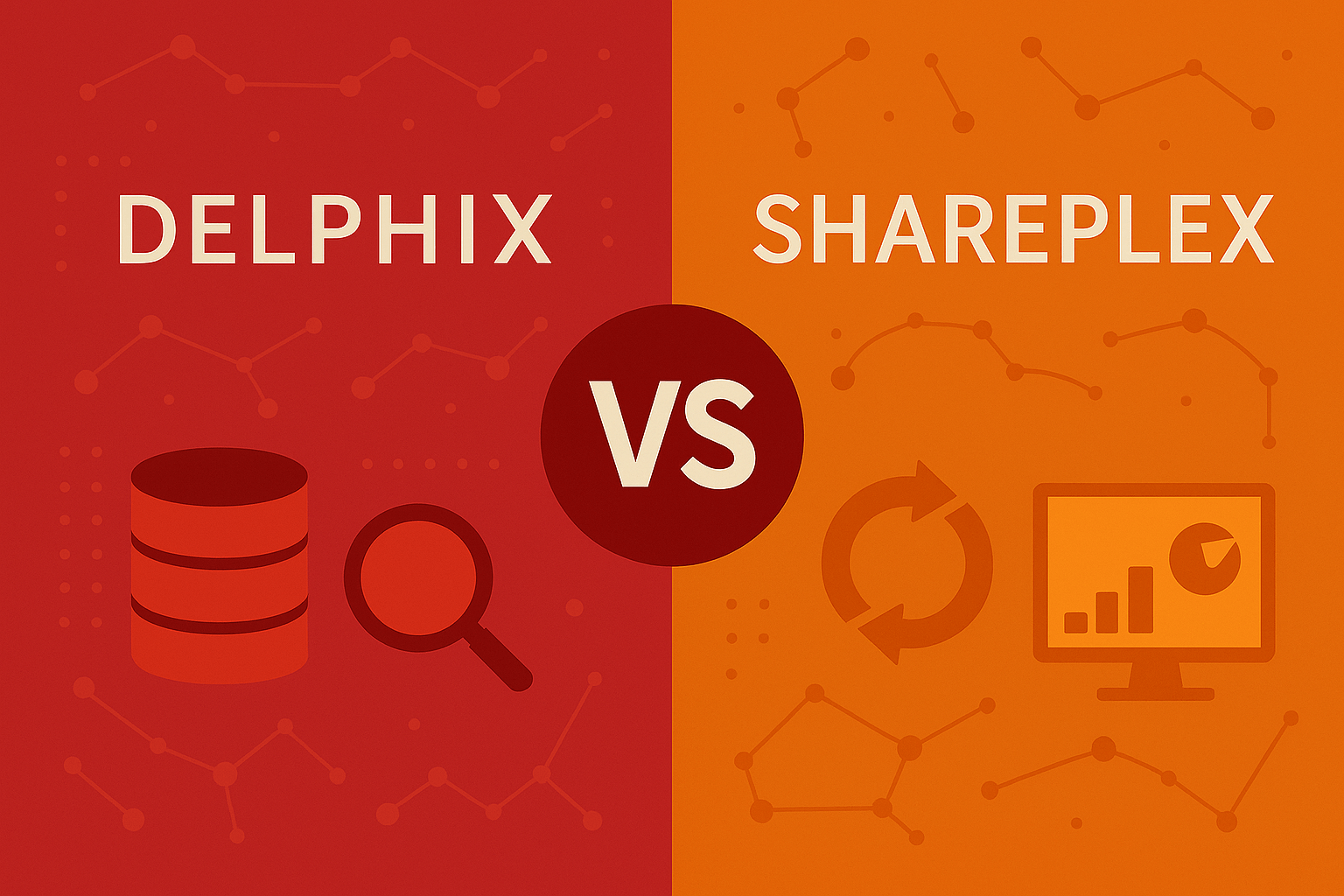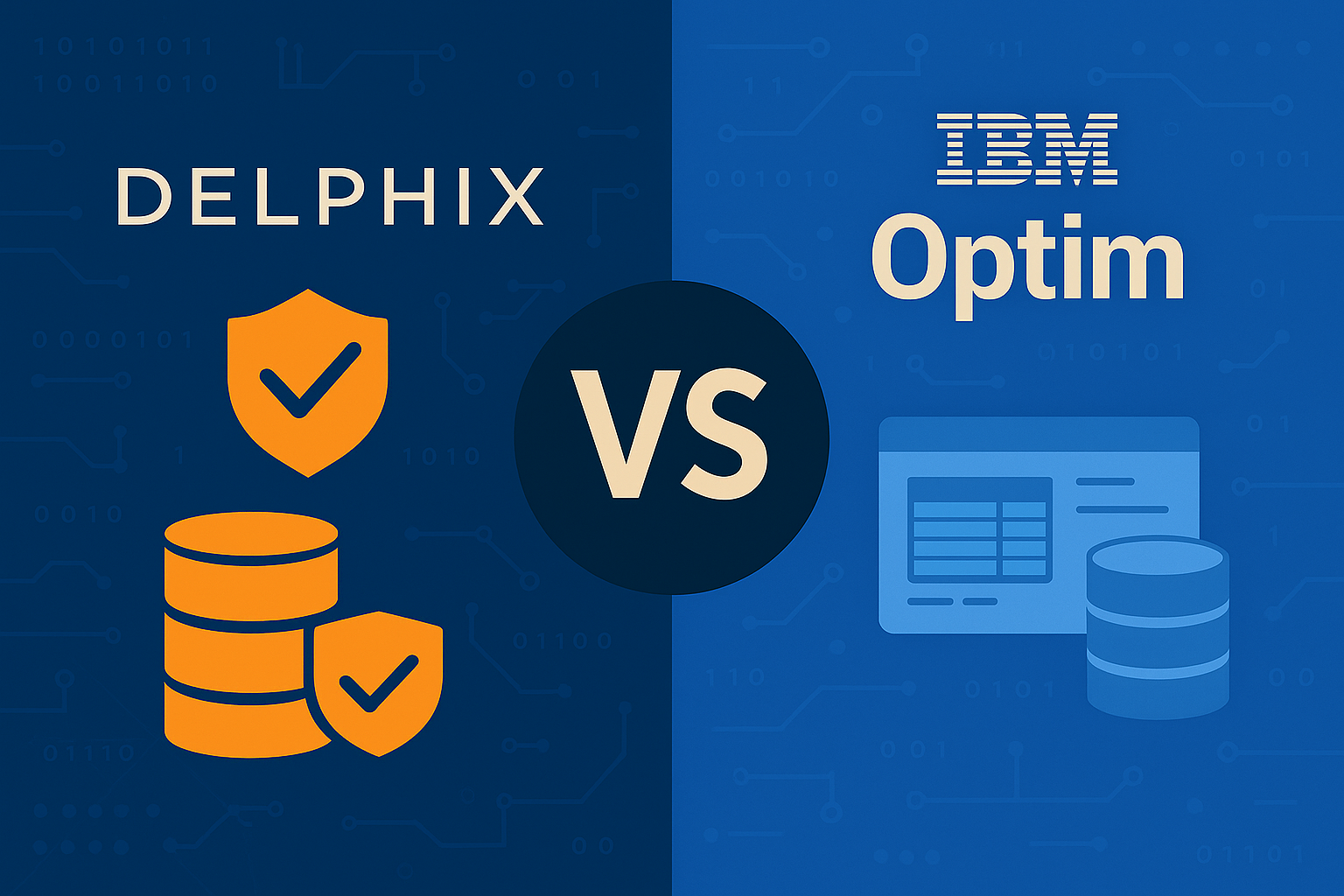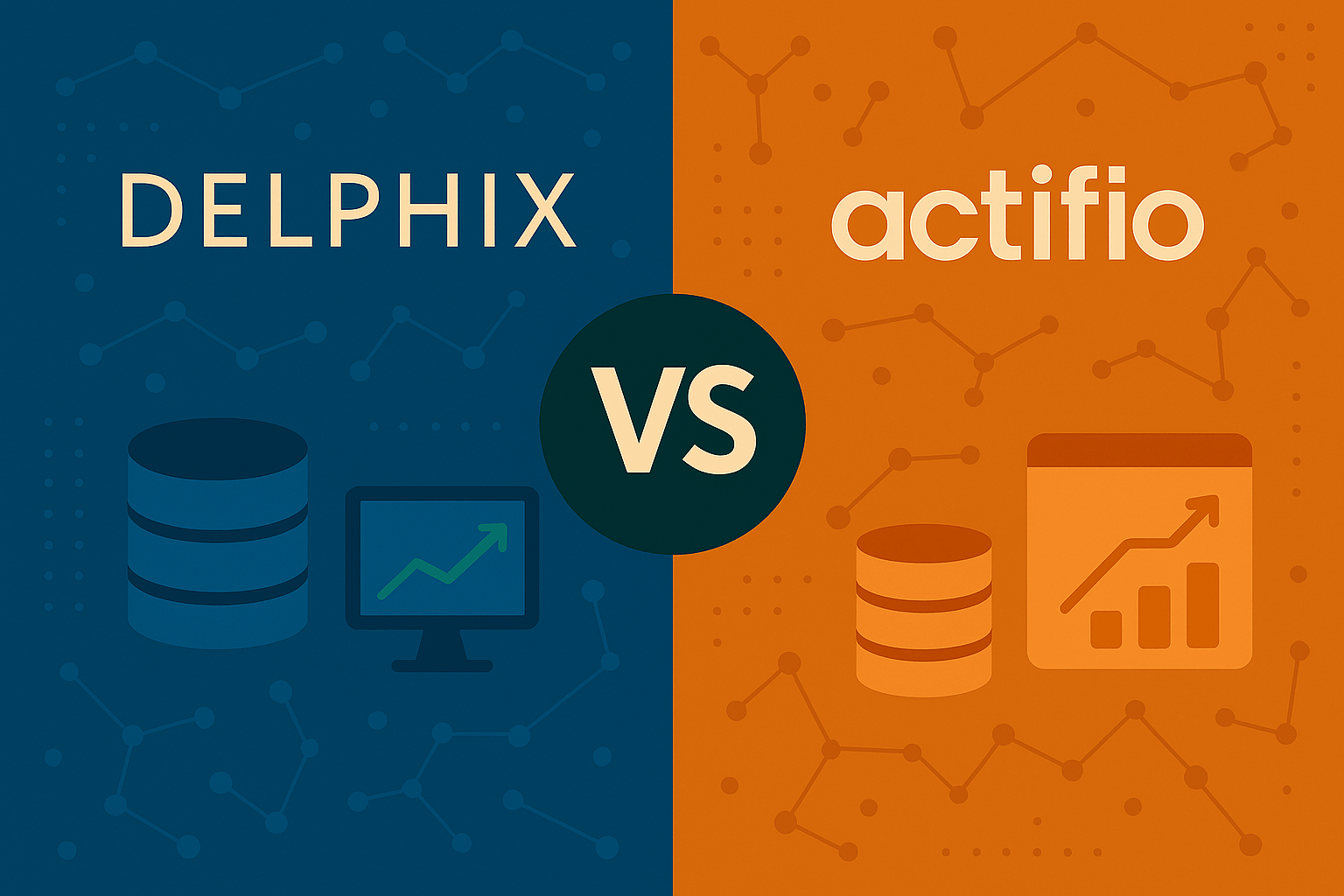Delphix vs K2View: Which Test Data Management Platform is Right for Your Enterprise?
In today’s rapidly evolving digital landscape, organizations face mounting pressure to accelerate software development while maintaining strict data governance and compliance standards. The choice between test data management platforms like Delphix and K2View represents a critical decision that can significantly impact your development velocity, storage costs, and ability to manage complex data environments across multiple sources. Organizations are re-evaluating their TDM strategies to keep pace with complex data landscapes and CI/CD workflows, ensuring their solutions align with modern development practices. Additionally, test data management processes are increasingly focusing on enabling shift-left testing methodologies to improve software quality early in the development cycle.
As enterprises grapple with increasingly sophisticated testing environments and the demand for realistic test data, the debate between these two industry leaders has intensified. Delphix, recently acquired by Perforce in Q1 2024, brings proven data virtualization capabilities to the table, while K2View offers an innovative entity-based approach that promises to revolutionize how organizations think about data integration and master data management. Test data management solutions have been available for over a decade but faced a lack of innovation until recent advancements, making the current competition between these platforms particularly significant. Delphix ensures straightforward deployment with robust customer support, which has been a key factor in its adoption by enterprises.
This comprehensive comparison will help you assess which platform aligns best with your organization’s specific requirements, from basic test data provisioning to advanced capabilities supporting ci cd pipelines and comprehensive data privacy compliance across large enterprises. The effectiveness of TDM solutions is crucial for accelerating engineering velocity and ensuring high-quality software development, making the right choice even more critical. High-quality output in test data management is vital for timely identification and resolution of bugs during the testing phase, ensuring smoother development cycles. Test data management solutions should facilitate data reservation, versioning, and rollback features to enhance efficiency and mitigate testing risks.
Choose the Right Test Data Management Solution for Your Needs
Selecting between Delphix and K2View requires understanding how each platform’s core architecture addresses your organization’s unique challenges in managing production data for lower environments. The fundamental difference lies in their approach: Delphix excels in data virtualization through copy-on-write methodology, while K2View focuses on business entity management through real-time data integration. However, data virtualization tools typically provide a complete replica of data, which complicates the provisioning of a subset of test data. Delphix's subsetting only works at the table level without maintaining referential integrity, which can be a limitation for organizations with complex data relationships. Data privacy and protection methods in test data management should include protecting personally identifiable information (PII) throughout the data management process to ensure compliance and security.
The recent Perforce acquisition of Delphix in Q1 2024 has introduced uncertainty around the platform’s future development roadmap, making this comparison more critical than ever. Organizations must now weigh the stability of an established solution against the potential innovation disruption that typically accompanies major acquisitions.
When comparing these solutions, consider three primary factors: implementation complexity, ROI timeline, and long-term scalability. Delphix typically offers quicker deployment and faster time-to-value, making it attractive for organizations seeking immediate improvements in their testing processes. K2View, while requiring more substantial upfront investment in configuration and training, provides deeper integration capabilities that can transform how your organization manages data across multiple data sources. Performance in test data management tools is critical to ensure that data provisioning does not slow down development and testing workflows, making this an essential consideration in your evaluation.
Your decision framework should prioritize understanding how each platform handles your specific database technologies, nosql data stores, and the complexity of your existing data landscape. Organizations with straightforward virtualization needs and immediate compliance requirements often find Delphix more suitable, while those requiring sophisticated entity-level data management and real-time integration typically benefit more from K2View’s advanced capabilities.
What Makes These Test Data Management Platforms Unique?
Delphix - Data Virtualization Excellence
Delphix has established itself as a market leader in test data management through its innovative data virtualization technology. With 28.3% mindshare and an impressive 7.7 average user rating, the platform has become synonymous with efficient, automated test data delivery for development and testing environments. Delphix is cost-effective with quick ROI, appealing to budget-conscious enterprises looking for immediate value from their test data management investments. However, Delphix Test Data Management supports a limited set of database vendors and versions, which may restrict its applicability in diverse IT environments.
The platform’s core strength lies in its copy-on-write methodology, which creates virtual instances of production databases without requiring full data replication. This approach dramatically reduces storage costs while enabling rapid provisioning of compliant test data. Organizations can create, refresh, and manage multiple testing environments simultaneously, with each environment appearing as a complete database while sharing underlying storage efficiently. However, the process of masking PII data in virtualized test environments can create vulnerabilities during staging before masking is complete. Delphix offers features for transforming production data but requires scripts for complex manipulations, which can add to the implementation effort.

Delphix excels in data masking automation, providing robust capabilities for protecting sensitive information while maintaining referential integrity across complex data relationships. The platform’s ability to integrate seamlessly with ci cd pipelines makes it particularly valuable for organizations embracing DevOps practices and modern software development methodologies.
However, the recent Perforce acquisition has created uncertainty among users and prospects. Many organizations report concerns about future development priorities and potential technology integration challenges. Additionally, Delphix faces limitations in handling ephemeral database functionality and can struggle with multi-terabyte processing jobs that may require days to complete. Using virtualized test data management can also lead to longer setup times and requires high-end hardware, increasing the total cost of ownership.
The platform’s data masking capabilities are comprehensive but operate primarily at the table level, which can limit subsetting effectiveness in environments requiring precise business entity relationships. Despite these limitations, Delphix remains a powerful tool for organizations prioritizing quick ROI and streamlined automation in their test data management processes.
K2View - Entity-Based Data Integration
K2View takes a fundamentally different approach to test data management, organizing data around business entities such as customers, orders, and products rather than focusing purely on database-level virtualization. With 6.1% mindshare in the test data management market, K2View has carved out a specialized niche among organizations requiring sophisticated data integration capabilities. K2View's Micro-Databases are individually encrypted and governed according to role-based access controls, ensuring secure and compliant data management.
The platform’s entity-based methodology creates micro-databases for each business object, enabling real-time data synchronization across multiple systems while maintaining complete data lineage. This approach proves particularly valuable for organizations dealing with complex data relationships spanning multiple databases, legacy systems, and modern applications. K2View supports standard relational databases and NoSQL connections through its integration tool, making it versatile for diverse data environments.
K2View’s strength in real-time data integration sets it apart from traditional test data management solutions. The platform can continuously synchronize data changes across source systems, ensuring that testing environments always reflect current business conditions. This capability proves invaluable for organizations requiring up-to-date customer information for regression testing or complex scenario validation.
The platform offers robust self-service capabilities through API-driven provisioning, allowing development teams to request and receive masked, subset data without requiring constant intervention from database administrators. This self-service model can significantly reduce bottlenecks in the development process while maintaining appropriate data governance controls.
However, K2View’s sophisticated capabilities come with higher implementation complexity. Organizations typically require significant upfront investment in mapping business relationships and configuring entity definitions. The platform’s self-hosted deployment model also requires more substantial infrastructure management compared to cloud-native alternatives.
Despite these challenges, K2View delivers significant long-term ROI for organizations willing to invest in proper implementation. The platform’s advanced functionality supports complex use cases that simpler data virtualization tools cannot address effectively, making it particularly attractive for large enterprises with sophisticated data integration requirements.
Delphix vs K2View: Key Platform Differences
The architectural differences between Delphix and K2View reflect fundamentally different philosophies about how organizations should manage and deliver test data. Understanding these differences is crucial for making an informed platform selection that aligns with your organization’s current needs and future growth plans.
|
Aspect |
Delphix |
K2View |
|---|---|---|
|
Core Architecture |
Data virtualization with copy-on-write technology |
Entity-based data management with micro-databases |
|
Data Handling |
Table-level subsetting and virtualization |
Business entity subsetting with relationship preservation |
|
Implementation |
Streamlined deployment with some UI navigation challenges |
Complex initial setup requiring business mapping |
|
Database Support |
Proprietary interfaces for major relational databases |
Proprietary format conversion for diverse data sources |
|
Scalability |
Multi-terabyte processing limitations reported |
Average performance for large-scale data integration |
|
Modern Features |
Limited NoSQL support, no generative AI |
Limited generative AI, focuses on real-time integration |
Delphix’s data virtualization approach works exceptionally well for organizations with standardized database environments and clear compliance requirements. The platform’s ability to create virtual copies rapidly makes it ideal for supporting agile development cycles where teams need quick access to refreshed test data. However, its table-level subsetting approach can create challenges when dealing with complex referential integrity requirements across multiple related tables.
K2View’s entity-based approach excels in environments where business logic drives data relationships. By organizing data around business entities, the platform can maintain complex relationships while providing granular control over data access and masking. This approach proves particularly valuable for organizations in regulated industries where audit trails and data lineage are critical compliance requirements.
Both platforms face challenges in supporting modern technologies like nosql data stores and advanced AI-driven capabilities. Neither solution currently offers comprehensive generative AI features that newer market entrants are beginning to provide. The current test data management (TDM) market is innovating due to the advent of data synthesis and generative AI technologies, which are reshaping how organizations approach test data creation and management. Synthetic test data generation is gaining popularity as it allows organizations to test new functionalities without exposing sensitive information.
The performance characteristics of each platform vary significantly based on use case complexity. Delphix typically performs well for straightforward virtualization scenarios but can struggle with very large datasets. K2View’s performance depends heavily on the complexity of entity relationships and the number of source systems involved in data integration processes.
What Industry Experts and Users Say
User feedback and industry analysis reveal important insights about real-world experiences with both platforms. These perspectives provide valuable context for understanding how theoretical capabilities translate into practical benefits and challenges.
Delphix users consistently praise the platform’s automation capabilities and the speed at which they can achieve measurable results. Many organizations report significant improvements in development velocity and reduced storage costs within months of implementation. The platform’s compliance automation features receive particular recognition from users in regulated industries who appreciate the ability to automatically mask sensitive data while maintaining referential integrity.
However, users also report frustrations with Delphix’s user interface, which many describe as outdated and difficult to navigate. The platform’s requirement for sales engagement to access pricing information creates additional friction for organizations in early evaluation stages. Some users express concern about the platform’s ability to handle very large datasets efficiently, with reports of multi-terabyte jobs requiring days to complete.

K2View customers consistently highlight the platform’s advanced data-driven insights and comprehensive customer support as major differentiators. Organizations using K2View often report significant improvements in their ability to understand and manage complex data relationships across their enterprise. The platform’s real-time integration capabilities receive strong praise from users who need current data for testing and development processes.
The primary criticism of K2View centers on implementation complexity and the learning curve required for effective platform utilization. Many users note that the platform requires significant technical expertise and upfront investment in business process mapping. While K2View offers a free trial, users report that the trial period often isn’t sufficient to fully evaluate the platform’s capabilities for complex enterprise environments.
Industry analysts note that both platforms represent mature solutions that have served the market well but may struggle to compete with newer entrants offering more modern capabilities. The lack of generative AI features and limitations in supporting modern data architectures are frequently cited as areas where both platforms need improvement.
Performance feedback varies significantly based on implementation complexity and organizational requirements. Organizations with straightforward test data management needs often find Delphix provides excellent value and quick results. Those requiring sophisticated data integration and real-time capabilities typically report better long-term satisfaction with K2View despite higher initial implementation costs.
Platform Capabilities and Requirements Overview
Understanding the specific capabilities and requirements of each platform helps organizations make informed decisions based on their current infrastructure and future technology plans. Both platforms target large enterprises but offer different paths to achieving test data management objectives.
Delphix’s primary strengths center on automation, compliance, and cost-effective implementation. The platform excels in environments where organizations need rapid deployment of secure, masked test data across multiple development and testing environments. Its data masking capabilities automatically protect sensitive information while maintaining the relationships necessary for realistic testing scenarios.
The platform’s automation features reduce the manual effort required to provision and refresh test data, enabling development teams to focus on core application development rather than data management tasks. This automation proves particularly valuable in organizations with frequent release cycles and multiple concurrent development projects requiring access to current, realistic test data.
K2View’s strengths lie in real-time integration, comprehensive data lineage, and sophisticated entity-based management capabilities. The platform excels in scenarios where organizations need to understand and manage complex data relationships across multiple systems and technologies. Its ability to provide real-time synchronization ensures that testing environments accurately reflect current business conditions.
The platform’s data lineage capabilities provide detailed tracking of data flow and transformation across systems, supporting compliance requirements and enabling better understanding of data dependencies. This functionality proves invaluable for organizations undergoing digital transformation or legacy system modernization projects.
Both platforms require significant technical expertise for optimal implementation and ongoing management. Delphix typically requires database administration skills and understanding of virtualization technologies. K2View demands deeper knowledge of business processes and data relationships, requiring collaboration between technical teams and business stakeholders. Organizations prefer TDM solutions that provide near-real-time data for testing scenarios based on actual production workloads, ensuring that testing environments remain relevant and effective.
Pricing information for both platforms requires direct vendor contact, reflecting the custom nature of enterprise implementations. Organizations should expect significant investment in either platform, with costs varying based on data volume, complexity, and specific feature requirements. Implementation timelines typically range from several weeks for basic Delphix deployments to several months for complex K2View configurations. The test data management market is seeing a shift towards cloud-based solutions as organizations move to improve scalability and reduce costs.
Which Test Data Management Platform is Right for You?
Choose Delphix if you want:
Delphix represents the optimal choice for organizations prioritizing rapid implementation and proven data virtualization technology. If your primary goal is to quickly reduce storage costs while improving the efficiency of your development and testing environments, Delphix’s established market presence and streamlined approach offer compelling advantages. For organizations considering Delphix alternatives, there are several other solutions that might better fit specific needs or environments.
Organizations with straightforward compliance requirements will appreciate Delphix’s automated data masking capabilities and its ability to integrate seamlessly with existing development workflows. The platform’s strong track record in supporting ci cd pipelines makes it particularly suitable for teams embracing modern DevOps practices and requiring consistent, reliable access to compliant test data.
The platform works exceptionally well for organizations operating primarily with relational databases and seeking to optimize their existing test data management processes rather than fundamentally transforming their data architecture. Delphix’s quick ROI timeline makes it attractive for organizations needing to demonstrate immediate value from their test data management investment.
However, organizations considering Delphix should carefully evaluate the potential impact of the recent Perforce acquisition on future platform development and support. While the acquisition brings additional resources and market stability, it also introduces uncertainty about long-term product strategy and integration with other Perforce technologies.
Choose K2View if you want:
K2View presents the best option for organizations requiring sophisticated entity-based data management aligned with complex business processes and relationships. If your organization manages data across diverse systems and needs real-time integration capabilities, K2View’s innovative approach to business entity management offers unique advantages that traditional virtualization cannot match.
Organizations in industries with complex regulatory requirements will benefit from K2View’s comprehensive data lineage capabilities and its ability to maintain detailed audit trails across all data transformation and integration processes. The platform’s real-time synchronization ensures that compliance reporting accurately reflects current business conditions.
The platform excels in environments where organizations are willing to invest significantly in upfront configuration for substantial long-term benefits. K2View’s advanced capabilities support complex use cases involving customer 360 initiatives, legacy modernization projects, and sophisticated analytics requiring integrated data from multiple sources.
Organizations choosing K2View should prepare for higher initial investment in both technology and human resources. The platform requires dedicated expertise in business process mapping and ongoing management of entity definitions. However, organizations making this investment typically report significant improvements in their ability to leverage data strategically across the enterprise.

The decision between Delphix and K2View ultimately depends on your organization’s tolerance for complexity, timeline requirements, and long-term data strategy objectives. Organizations seeking proven, straightforward solutions for immediate test data management needs will find Delphix more suitable. Those requiring transformational capabilities and willing to invest in sophisticated data integration will benefit more from K2View’s advanced functionality.
Both platforms serve important roles in the evolving test data management landscape, and the right choice depends entirely on aligning platform capabilities with your organization’s specific requirements, technical expertise, and strategic objectives. Consider conducting proof-of-concept implementations with both platforms to thoroughly assess how each solution performs with your actual data and use cases before making a final decision.
Factory Thread: Built for Manufacturing, Beyond Delphix and K2View
Delphix and K2View help enterprise IT teams manage test data, but Factory Thread offers something these general-purpose tools don’t: real-time, governed access to production data from shop floor systems—without duplication, virtualization, or complex mapping.
Why Factory Thread is Different:
-
Live, compliant access to data from MES, ERP, QMS, historians, sensors, and PLCs
-
Built-in masking and audit logging for regulatory compliance
-
No virtualization needed—no storage duplication, staging environments, or refresh cycles
-
Supports shift-left testing by giving engineers real-time data views from actual production runs
-
Streamlined edge + cloud architecture tailored for manufacturers—not generic enterprise IT
While Delphix and K2View create test data environments, Factory Thread eliminates the need to create and sync test datasets altogether. Instead, it provides governed, role-based access to live operational data—masking what needs to be masked, while keeping systems up to date in real time.
For manufacturing teams that want to test and validate with real production data—without adding cost or complexity—Factory Thread is the purpose-built choice.
Share this
You May Also Like
These Related Stories

Delphix vs SharePlex: Which Data Management Solution is Right for You?

Delphix vs IBM Optim: Which Test Data Management Platform is Right for You?



No Comments Yet
Let us know what you think